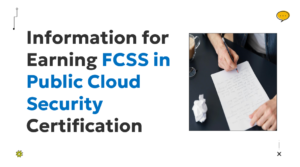Information for Earning FCSS in Public Cloud Security Certification
The Fortinet Certified Solution Specialist (FCSS) in Public Cloud Security certification tests the professional’s capability to safeguard these critical infrastructures. This certification not only validates your expertise in managing Fortinet public cloud solutions but also signifies a deep understanding of advanced security mechanisms crucial for today’s digital landscape.
The FCSS in Public Cloud Security certification focuses on the implementation and management of Fortinet solutions within public cloud environments. It emphasizes skills essential for designing, administering, monitoring, and troubleshooting Fortinet-based security frameworks across various cloud platforms. Professionals aiming to achieve this certification must pass the core exam – NSE7_PBC-7.2 NSE 7 – Public Cloud Security 7.2, which rigorously assesses their applied knowledge and technical proficiency.

Fortinet NSE7_PBC-7.2 Core Exam Details
The NSE7_PBC-7.2 exam is the cornerstone of the FCSS certification path. It consists of 37 questions to be completed within 70 minutes, focusing on FortiGate 7.2 product version. The NSE7_PBC-7.2 exam is conducted in English and evaluates candidates on several critical areas:
– FortiGate Deployments in Public Cloud: Understanding and deploying FortiGate solutions, configuring transit VPCs and gateways, integrating with Azure VWAN, and deploying SD-WAN transit gateway connects.
– Automation: Proficiency in deploying and managing Fortinet solutions using automation tools like Terraform and Ansible, understanding Azure security concepts, and handling routing and restrictions within public clouds.
– Deploying FortiGate-VM with Automation Tools: Skills in deploying FortiGate-VM in AWS and Azure using Terraform, configuring high-availability solutions, and automating deployments to ensure efficient and consistent security implementations.
– Troubleshooting and FortiCNP: Expertise in troubleshooting connectivity issues within AWS EC2, SD-WAN connect issues, Azure SDN connectors, and using FortiCNP to mitigate cloud security risks.
Why Pursue the FCSS Certification?
For network and security professionals, obtaining the FCSS in Public Cloud Security certification offers several benefits:
Validation of Skills: The certification attests to your ability to manage and secure public cloud environments using Fortinet solutions, a highly sought-after skill in the industry.
Career Advancement: Certified professionals are recognized for their expertise, making them attractive candidates for roles that demand advanced cloud security capabilities.
Enhanced Knowledge: The certification process enriches your understanding of public cloud infrastructures, Fortinet’s integration, and security solutions, enabling you to address complex security challenges effectively.
Industry Recognition: Fortinet certifications are globally recognized, positioning you as a knowledgeable and capable professional in the field of cloud security.
Preparation for the NSE7_PBC-7.2 Exam
Preparing for the NSE7_PBC-7.2 exam involves a thorough understanding of Fortinet’s public cloud solutions and hands-on experience in deploying and managing these technologies. Here are some preparation tips:
– Hands-on Practice: Engage with Fortinet products in a public cloud environment to gain practical experience.
– Study Resources: Utilize Fortinet’s official study guides, online courses, and community forums to deepen your knowledge.
– Practice Exams: Take NSE7_PBC-7.2 practice tests to familiarize yourself with the exam format and identify areas where you need further study.
The FCSS in Public Cloud Security certification is a robust validation of your ability to secure and manage public cloud environments using Fortinet solutions. As businesses increasingly rely on cloud infrastructures, the demand for skilled professionals who can ensure these environments are secure continues to grow. By achieving this certification, you not only enhance your technical skills but also position yourself as a leader in the field of cloud security.
